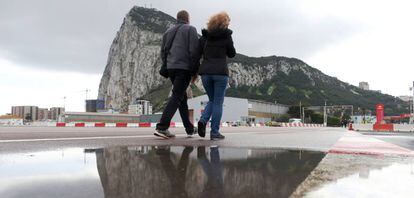Spain signs landmark agreements with UK over Gibraltar
The four Memorandums of Understanding are aimed at reducing inequality between the Rock and its Spanish neighbor during the Brexit transition period


Spain and the United Kingdom have signed the most important bilateral agreement over Gibraltar in more than a decade. On Thursday, the governments of both countries officially signed four Memorandums of Understanding (MoUs) on the future of Gibraltar, a British Overseas Territory in the south of the Iberian peninsula, once the UK leaves the European Union, a process known as Brexit.
The price difference between tobacco products in Spain and Gibraltar will be reduced to 32%
The agreements are aimed at reducing inequality between the Rock and Campo de Gibraltar, the neighboring Spanish region in Andalusia where high unemployment and drug trafficking are major problems.
The MoUs address the four most sensitive areas for relations between Spain and Gibraltar – tobacco, the environment, customs and policing cooperation and the rights of cross-border workers. It represents the first understanding Madrid and London have reached over issues that have created friction ever since Gibraltar was ceded to Great Britain in 1713 under the Treaty of Utrecht. An earlier attempt was made in 2006 with the so-called Córdoba agreements but this was never applied due to distrust from both parties.
While the MoUs are a huge step forward, they only apply to the Brexit transition period, which is less than two years long. The agreements also explicitly state that they do not “change the respective legal positions of the Spanish Kingdom and the United Kingdom regarding the sovereignty and jurisdiction of Gibraltar.” In other words, the Spanish government cannot use the bilateral framework to push for co-sovereignty of the British Overseas Territory, at least until it expires at the end of the transition period, earmarked for January 2021.
Importantly, the agreement sets a limit on the price differences between tobacco products sold in Spain and those sold in Gibraltar, where they are much cheaper. Gibraltar is the biggest entry point for illegal tobacco products into Spain. Last year Spanish authorities seized more than 600,000 cartons of cigarettes, a 158% rise from 2016, according to official data.
The text outlines that all parties agree “on the need to reduce the price difference of tobacco products.” To achieve this, the government of Gibraltar has agreed to ensure that “the average retail price differential of tobacco products ... will be no more than 32% greater than the most recently published Spanish prices for the equivalent tobacco products” by the end of June 2020. Currently, the minimum gap is 48%, according to data from the Foreign Ministry. After years without any agreement on this issue, the government of Gibraltar declares in the MoU that it is “concerned about the health consequences of smoking and the existence of an illicit trade in tobacco.”
The MoUs only apply to the Brexit transition period, which is less than two years long
The rest of the documents cover the exchange of information and the creation of joint committees to oversee the complex relationship between Spain and Gibraltar.
Under the new bilateral framework, a Technical and Coordination Committee (TCC) will be created to improve cooperation on air quality, water quality and the protection of marine habitats. The TCC also includes the possibility of discussing “land reclamation” – a reference to a practice in Gibraltar where cement and other materials are placed in waters disputed by Madrid and London.
On the issue of citizen rights, the agreement is more vague. The text just reaffirms that Spanish people living or with interests in the Rock, and Gibraltarians in Spain, will not be discriminated against.
A tax treaty will be added to the MoUs once it is receives parliamentary approval. This treaty aims to reduce what Spain views as unfair competition from Gibraltar, where many businesses choose to register because of the lower taxes even through their activities take place in Spain. There are 55,000 registered businesses in Gibraltar, even though it has just over 30,000 residents.
English version by Melissa Kitson.












































